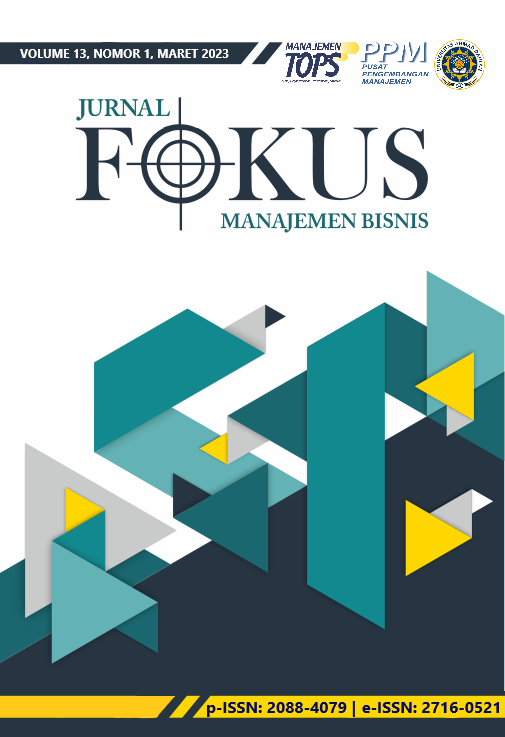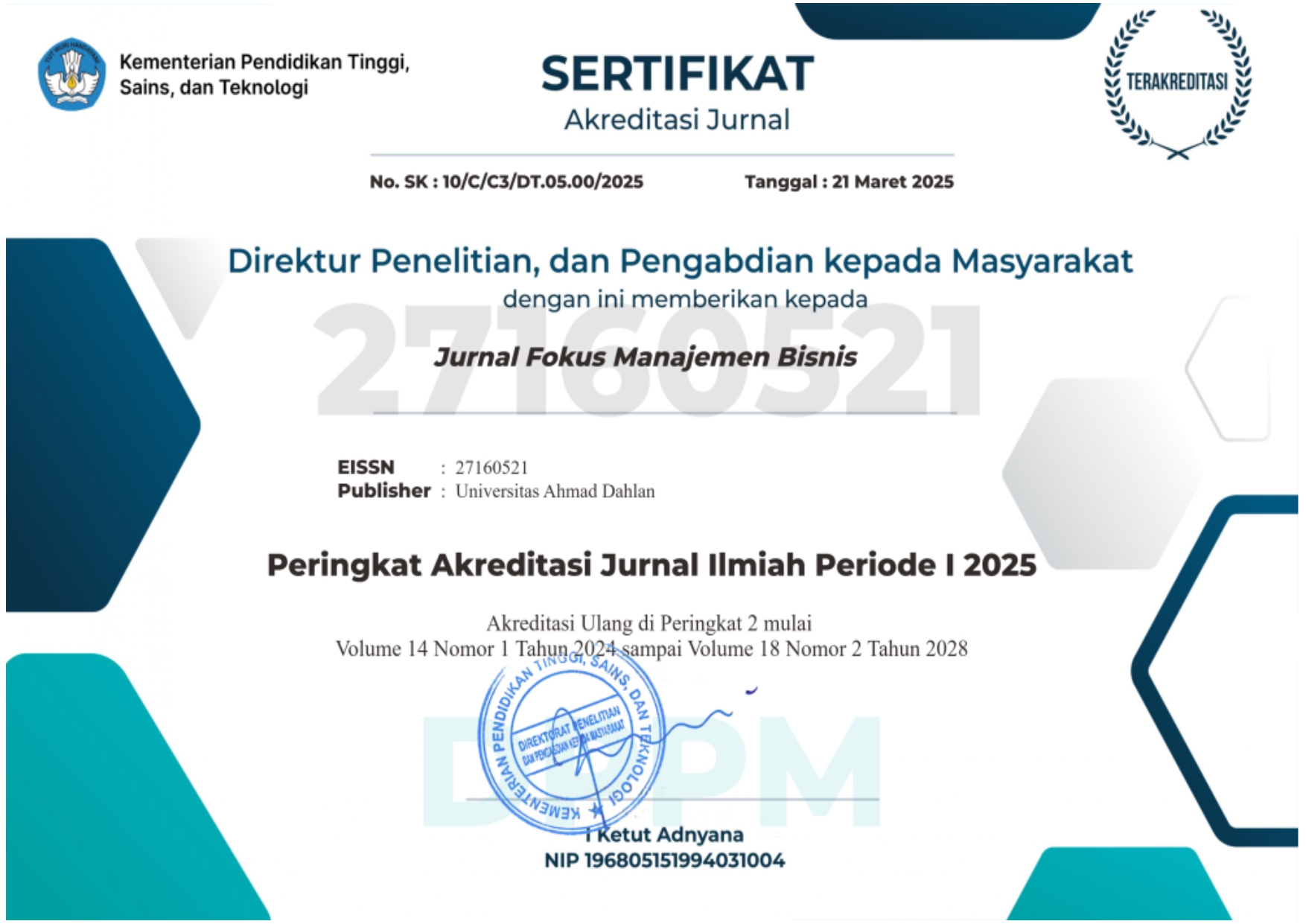DIVERSIFIKASI SEBAGAI STRATEGI KEBERLANJUTAN PROGRAM KEWIRAUSAHAAN BERBASIS DIGITAL
DOI:
https://doi.org/10.12928/fokus.v13i1.7303Abstract
Diversification is a way to support the sustainability of digital-based strategies. The purpose of this research is to formulate a digital-based entrepreneurship development strategy. This study uses a qualitative approach through an interpretive paradigm. The population in this study was all young entrepreneurs between the ages of 25 and 40 years, and the sampling technique was non-probability sampling with a sample size of 280 respondents. A validity and reliability test was carried out for the data quality test with the result that all data was valid dan reliable. The analytical method used to formulate a digital-based marketing strategy was SWOT analysis (Strength, Weakness, Opportunity, Threat) by identifying the External Factor Analysis Strategy (EFAS) and the Internal Factor Analysis Strategy (IFAS). The result of this study shows that strategy formulation that should be obtained is using the opportunity to minimize weakness. Thus the rationalization strategy is the recommended strategy.
References
Bosma, N., Content, J., Sanders, M., & Stam, E. (2018). Institutions, Entrepreneurship, And Economic Growth In Europe. Small Business Economics, 51(2). https://doi.org/10.1007/s11187-018-0012-x
Bozhikin, I., Macke, J., & da Costa, L. F. (2019). The Role Of Government And Key Non-State Actors In Social Entrepreneurship: A Systematic Literature Review. In Journal of Cleaner Production (Vol. 226). https://doi.org/10.1016/j.jclepro.2019.04.076
David, F. R. (2015). Strategic Management: A Competitive Advantage Approach, Concept & Cases. In Strategic Management.
Eddy, Y. (2016). Manajemen Strategi. Andi Offset.
Fan, M., Qalati, S. A., Khan, M. A. S., Shah, S. M. M., Ramzan, M., & Khan, R. S. (2021). Effects Of Entrepreneurial Orientation On Social Media Adoption And SME Performance: The Moderating Role of Innovation Capabilities. PLoS ONE, 16(4 April 2021). https://doi.org/10.1371/journal.pone.0247320
Geissinger, A., Laurell, C., Sandström, C., Eriksson, K., & Nykvist, R. (2019). Digital Entrepreneurship And Field Conditions For Institutional Change– Investigating The Enabling Role Of Cities. Technological Forecasting and Social Change, 146. https://doi.org/10.1016/j.techfore.2018.06.019
Ghozali, I. (2017). Analisis Multivariate dengan Program SPSS. Semarang: Badan Penerbit Universitas Diponegoro.
Grzeslo, J. (2020). A Generation Of Bricoleurs: Digital Entrepreneurship In Kenya. World Journal of Entrepreneurship, Management and Sustainable Development, 16(4), 403–412. https://doi.org/10.1108/WJEMSD-10-2019-0078
Hair, J. F., Hult, G. T. M., Ringle, C. M., & Sarstedt, M. (2017). A Primer on Partial Least Squares Structural Equation Modeling (PLS-SEM). Sage, 165.
Hamid, R. S. (2022). Strategi Pengembangan Kewirausahaan: Peran Wirausaha Milenial dan Media Pemasaran Digital dalam Mendukung Ekonomi Kreatif. CV. AA. RIZKY.
Hamid, R. S., Anwar, S. M., Salju, Rahmawati, Hastuti, & Lumoindong, Y. (2019). Using The Triple Helix Model To Determine The Creativity A Capabilities Of Innovative Environment. IOP Conference Series: Earth and Environmental Science, 343(1). https://doi.org/10.1088/1755-1315/343/1/012144
Helal, G., Ozuem, W., & Lancaster, G. (2018). Social Media Brand Perceptions Of Millennials. International Journal of Retail and Distribution Management, 46(10). https://doi.org/10.1108/IJRDM-03-2018-0066
Ikbal, M., & Hamid, R. S. (2016). Smartphone Use of Effectiveness in Supporting Young Entrepreneurs Business Activity in the Palopo Using Technology Acceptance Model (TAM). Information Management and Business Review, 8(1). https://doi.org/10.22610/imbr.v8i1.1196
Indahingwati, A., Launtu, A., Tamsah, H., Firman, A., Putra, A. H. P. K., & Aswari, A. (2019). How Digital Technology Driven Millennial Consumer Behaviour In Indonesia. Journal of Distribution Science, 17(8). https://doi.org/10.15722/jds.17.08.201908.25
Kiss, A. N., Danis, W. M., & Cavusgil, S. T. (2012). International Entrepreneurship Research In Emerging Economies: A Critical Review And Research Agenda. Journal of Business Venturing, 27(2). https://doi.org/10.1016/j.jbusvent.2011.09.004
Koufie, M. G. E., & Kesa, H. (2020). Millennials Motivation For Sharing Restaurant Dining Experiences On Social Media. African Journal of Hospitality, Tourism and Leisure, 9(1).
Kulb, C., Hennink, M., Kiiti, N., & Mutinda, J. (2016). How Does Microcredit Lead to Empowerment? A Case Study of the Vinya wa Aka Group in Kenya. Journal of International Development, 28(5). https://doi.org/10.1002/jid.3130
Leiber, T., Stensaker, B., & Harvey, L. C. (2018). Bridging Theory And Practice Of Impact Evaluation Of Quality Management In Higher Education Institutions: A SWOT Analysis. European Journal of Higher Education, 8(3). https://doi.org/10.1080/21568235.2018.1474782
Li, H., & Lo, H. Y. (2015). Do You Recognize Its Brand? The Effectiveness of Online In-Stream Video Advertisements. Journal of Advertising, 44(3). https://doi.org/10.1080/00913367.2014.956376
Littlewood, D., & Holt, D. (2018). Social Entrepreneurship And CSR Theory: Insights, Application And Value. In Research Handbook on Small Business Social Responsibility: Global Perspectives. https://doi.org/10.4337/9781784711825.00022
Liu, J., Zhu, Y., Serapio, M., & Cavusgil, S. T. (2019). The New Generation Of Millennial Entrepreneurs: A Review And Call For Research. International Business Review, 28(5). https://doi.org/10.1016/j.ibusrev.2019.05.001
Lock, R., & Lawton Smith, H. (2016). The Impact Of Female Entrepreneurship On Economic Growth In Kenya. International Journal of Gender and Entrepreneurship, 8(1). https://doi.org/10.1108/IJGE-11-2015-0040
Malhotra, N. K. (2010). Riset Pemasaran (Marketing Research). PT. Indeks.
Nambisan, S. (2017). Digital Entrepreneurship: Toward a Digital Technology Perspective of Entrepreneurship. Entrepreneurship: Theory and Practice, 41(6). https://doi.org/10.1111/etap.12254
Ng, E. S. W., Schweitzer, L., & Lyons, S. T. (2010). New Generation, Great Expectations: A Field Study Of The Millennial Generation. Journal of Business and Psychology, 25(2). https://doi.org/10.1007/s10869-010-9159-4
Olanrewaju, A. S. T., Hossain, M. A., Whiteside, N., & Mercieca, P. (2020). Social Media And Entrepreneurship Research: A Literature Review. In International Journal of Information Management (Vol. 50). https://doi.org/10.1016/j.ijinfomgt.2019.05.011
Pashkevich, M., Dorai-Raj, S., Kellar, M., & Dan, Z. (2012). Empowering Online Advertisements By Empowering Viewers With The Right To Choose: The Relative Effectiveness Of Skippable Video Advertisements On Youtube. Journal of Advertising Research, 52(4).
Rosita, R. (2020). Faktor Yang Mempengaruhi Perilaku Generasi Milenial Terhadap Keputusan Menggunakan Aplikasi Grabfood. Jurnal Lentera Bisnis, 9(1). https://doi.org/10.34127/jrlab.v9i1.348
Sari, A. P., Pelu, M. F. A. R., Dewi, I. K., Ismail, M., Siregar, R. T., Mistriani, N., Marit, E. L., Killa, M. F., Purba, B., & Lifchatullaillah, E. (2020). Ekonomi Kreatif. Yayasan Kita Menulis.
Sihombing, S. O., & Pramono, R. (2021). The Integration of Social Media to the Theory of Planned Behavior: A Case Study in Indonesia. Journal of Asian Finance, Economics and Business, 8(5).
Sugiyono. (2017). Metode Penelitian Bisnis (Pendekatan Kuantitatif, Kualitatif, Kombinasi dan R&D) (S. Y. Suryandari (ed.); 3rd ed.). Alfabeta Cv.
Sundari, C. (2019). Revolusi Industri 4.0 Merupakan Peluang Dan Tantangan Bisnis Bagi Generasi Milenial Di Indonesia. Prosiding Seminar Nasional Dan Call For Papers, Fintech Dan E-Commerce Untuk Mendorong Pertumbuhan Umkm Dan Industri Kreatif.
Tajvidi, R., & Karami, A. (2017). Can Social Media Marketing Improve Customer Relationship Capabilities and Firm Performance. Computers in Human Behavior, 39.
Thieme, T. A. (2015). Turning Hustlers Into Entrepreneurs, And Social Needs Into Market Demands: Corporate-Community Encounters In Nairobi, Kenya. Geoforum, 59. https://doi.org/10.1016/j.geoforum.2014.11.010
Wang, Y., Xu, L., & Solangi, Y. A. (2020). Strategic Renewable Energy Resources Selection For Pakistan: Based On SWOT-Fuzzy AHP Approach. Sustainable Cities and Society, 52. https://doi.org/10.1016/j.scs.2019.101861
Wurth, B., Stam, E., & Spigel, B. (2022). Toward an Entrepreneurial Ecosystem Research Program. Entrepreneurship: Theory and Practice, 46(3). https://doi.org/10.1177/1042258721998948
Young, S. J., Sturts, J. R., Ross, C. M., & Kim, K. T. (2013). Generational Differences And Job Satisfaction In Leisure Services. Managing Leisure, 18(2). https://doi.org/10.1080/13606719.2013.752213
Downloads
Published
How to Cite
Issue
Section
License
Copyright (c) 2023 Rahmad Solling Hamid, Suhardi M. Anwar, Imran Ukkas, Goso Goso

This work is licensed under a Creative Commons Attribution-ShareAlike 4.0 International License.
Authors who publish with this journal agree to the following terms:Â
- Authors retain copyright and grant the journal right of first publication with the work simultaneously licensed under a Creative Commons Attribution License that allows others to share the work with an acknowledgment of the work's authorship and initial publication in this journal.
- Authors are able to enter into separate, additional contractual arrangements for the non-exclusive distribution of the journal's published version of the work (e.g., post it to an institutional repository or publish it in a book), with an acknowledgment of its initial publication in this journal.
- Authors are permitted and encouraged to post their work online (e.g., in institutional repositories or on their website) prior to and during the submission process, as it can lead to productive exchanges, as well as earlier and greater citation of published work (See The Effect of Open Access).







